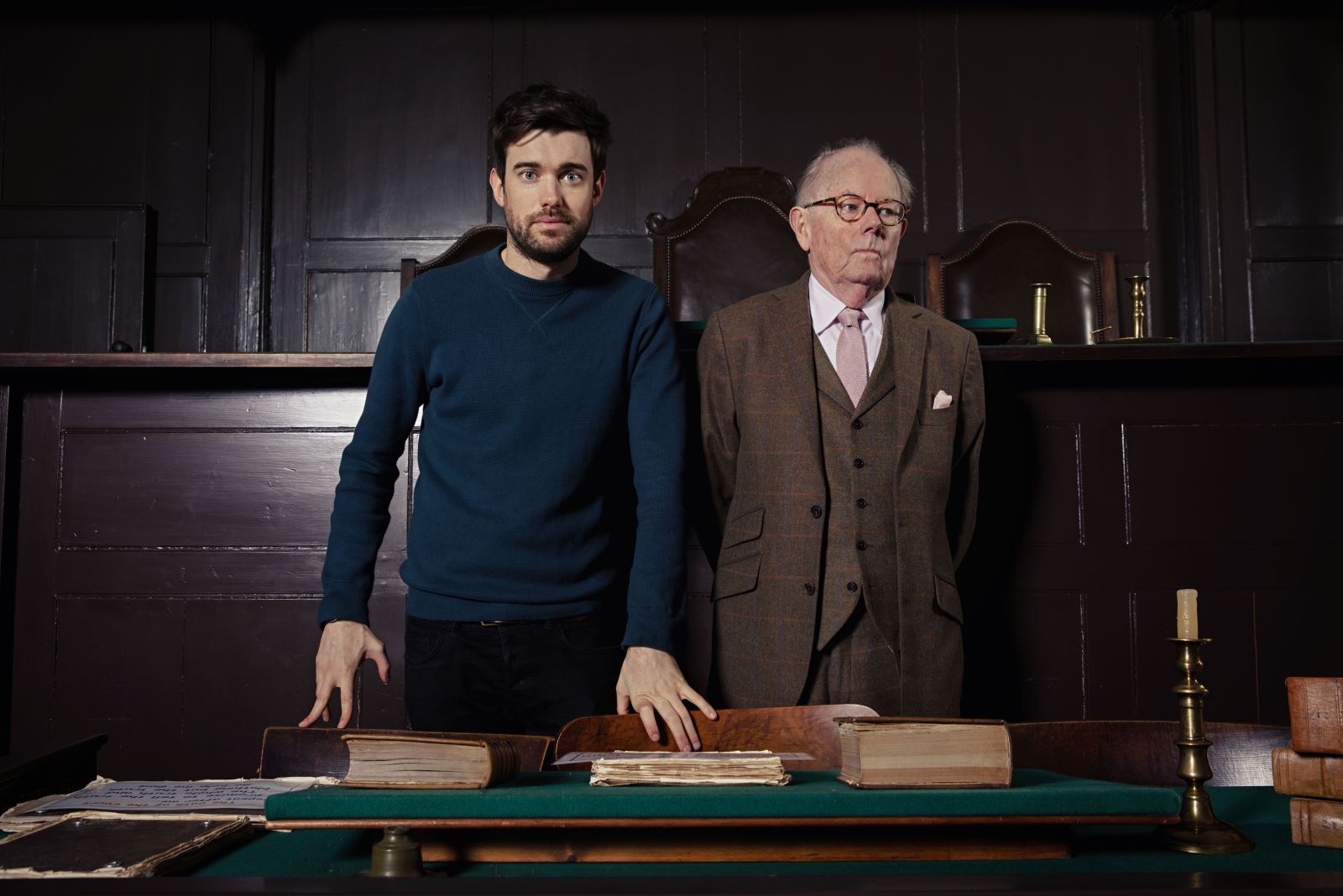05 August 2019
|
Jack & Michael Whitehall unearth skeletons at every turn … watch their story in ‘Who Do You Think You Are?’. Plus 3 top tips every family historian needs to know!
Hot on the trail of a wrong ‘un and a lunatic, Jack & Michael Whitehall unearth skeletons at every turn … watch their story unravel in ‘Who Do You Think You Are?’.
Affectionate and funny, the Jack and Michael Whitehall episode of ‘Who Do You Think You Are?’ kicks off to an entertaining, irreverent start, as you’d expect, as they piece together their Whitehall family line. Educated at private schools, Ampleforth and Marlborough College, the father and son duo’s past seems as though it’d be buffered from many of the hazards of life. But that’s the thing about families and family history… it just isn’t simple, and that wheel of fortune just keeps turning.
Having gleaned what they can from memory and poring over the family pictures at home, Jack and Michael Whitehall head over to Michael’s cousin Jennifer to find out more… and in particular to discover where it was that Jack’s great-grandfather (Richard Ernest Baxter Whitehall – known as REB) mysteriously got his money from.
‘So Jennifer we’re on the trail of my great-grandfather REB, and we’re hoping that you might know a little bit more than Michael – whose knowledge is a bit patchy. I think all the years of boozing have affected his memory.’ [typically cheeky Jack speaking about his father Michael]
The family story went that young REB’s father was killed in a pony and trap accident at work, and that his mother died shortly afterwards of a broken heart. The young orphan REB was then adopted by a wealthy businessman.
But as to further detail, it seemed as though no-one in the family could shed further light.
Jennifer, to Michael: ‘He never talked about his childhood, I never remember him talking about it. Do you?’
Michael: ‘No. But maybe we never asked him.’
Jennifer: ‘I wished I’d asked him.’
How many of us are in that predicament – just wishing we’d asked questions, been a bit more curious, thought to learn about our family’s past? Anyway, like most of us the next step in the Whitehalls’ journey was to turn to the census. It was here that the story took a darker turn, and the reason for REB’s reticence to talk about his parents’ past became a little clearer. We won’t tell you the story, because it’s just completely worth watching. (Do it!) But do be warned that it is far from the jaunty genealogical vibe that this episode started with.
That sad mystery solved, the Whitehall duo turned to another ancestor of theirs, Thomas Jones Phillips. And this time the shame caused by the action of previous generations was keenly felt by Jack.
Turn back the clock to the 1830s. It’s a few years after the Great Reform Act of 1832, when more men were granted the vote. However, in reality it was only a very small proportion of the adult male population who could vote. As a consequence of this the Chartist movement was rapidly gaining momentum: petitions were signed, rallies held, and even lives taken at the Newport Rising (where 22 people were killed in the streets of Newport by troops and constabulary).
Thomas Jones Phillips, direct ancestor of Jack and Michael Whitehall, was the Government ‘snitch’ and ‘wrong ‘un’, as Jack dubbed him, who led to the arrest of some of the Chartist ringleaders, some of whom were sentenced to death for their energies trying to fight for the votes for all men. Jack’s relief that the sentence was commuted to ‘transportation for life’ to Australia, is clear. And it’s something that most of us would certainly share. When we set out to trace our family trees we’d all like to find the heroes. However, as Jack says: 'Every story needs a villain. And it just happens that our ancestor is ... the villain.'
‘Every story needs a villain. And it just happens that our ancestor is … the villain.’
This episode is well worth a watch. Sometimes family history, like life, can be tough, but that makes it all the more relevant as we learn about who we are and get to understand the lives of the people who came before us.
3 top family history tips
We’re sure Jack and Michael Whitehall’s episode will have inspired you to have a go at tracing your own family history.
- Ask questions. Ask. And ask again. But take the time to be curious, to show the elders in your family that their lives matter, their memories matter, that the family story is something you want to learn and pass on. Do be careful and respectful how you go though, as there may also be many reasons why people don’t wish to speak about the past. Perhaps like Jack and Michael Whitehall’s ancestor REB they have invented a story to deflect attention from a traumatic chapter in their lives that they don’t want public.
- Be prepared for anything. It’s amazing how, in just a few generations, the values of society change, and how certain slivers of the family history can get lost from view. When researching your family history, you will find ancestors living lives that leave you in awe of their determination and accomplishments, and there will be those whose values or circumstances are something you find hard to relate to. Family history really just reflects the medley of human life. Perhaps like Jack and Michael Whitehall you may find an ancestor suffering from a medical complaint and incarcerated accordingly, or an ‘officious windbag and full-blown snitch’ (as Jack dubbed his ancestor Thomas Jones Phillips).
- Get out there. The web is a wonderful tool for researching our ancestors’ lives. Using just the census and birth, marriage and death records, like Jack and Michael Whitehall did, you’ll be amazed what you can find out about your ancestors’ names, occupations, whereabouts and causes of death, simply by searching the internet and ordering certificates. But be like Jack and Michael Whitehall and get out there. Go and visit the places your ancestors once lived. Visit archives. Try and get your hands on original records relevant to their lives. Check out the local archives, family history societies and local history societies to listen to talks by local historians to learn that indepth knowledge about the places your ancestors once lived and worked. All through the Jack and Michael Whitehall episode of ‘Who Do You Think You Are?’ there are expert historians, archivists and specialists to help.
Follow these useful leads to take your own genealogy journey:
How to find birth, marriage and death certificates (for England and Wales, the countries covered in the Jack and Michael Whitehall episode): see www.freebmd.org.uk for indexes and https://www.gro.gov.uk/gro/content/ for some indexes and to order certificates
How to find census records: www.ancestry.co.uk, www.findmypast.co.uk, www.myheritage.com and www.thegenealogist.co.uk
How to find archives: https://discovery.nationalarchives.gov.uk/find-an-archive
How to find a family history society: https://www.familyhistoryfederation.com/
How to find a local history society: https://www.balh.org.uk/







-84415.jpeg?&width=600&height=380&bgcolor=ffffff&mode=crop&format=webp&webp.quality=40&scale=both)

